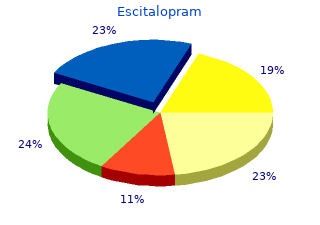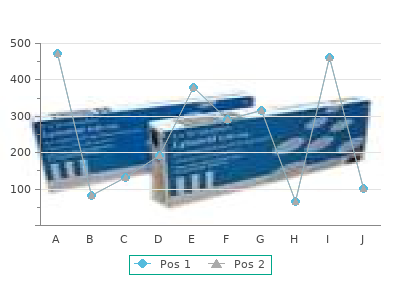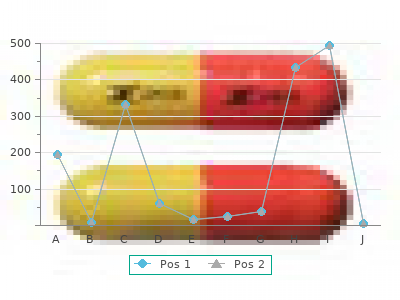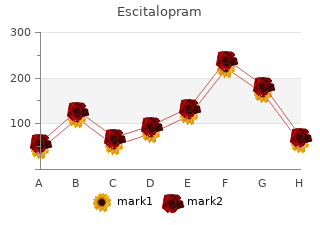Escitalopram
By I. Lukjan. Saint Olaf College.
Noblitt: Not all individuals with DID/MPD are motivated to achieve complete integration buy escitalopram 5 mg cheap. I believe the patient has the right to make this decision without coercion on the part of the therapist 20 mg escitalopram amex. If the patient asks me, "is it healthy to integrate? More important than integration is improving the level of functioning and the quality of life. Noblitt: I view integration as a process with many levels and steps to it. Before the alternates "go away," the individual with DID learns to integrate experience and behavior, reducing inner conflict and becoming more functional. Noblitt: Let me qualify my response by saying that I think it is important to work in trance states and hypnotherapy may be a good way to accomplish this. Hypnotherapy in the traditional sense may not always work with this diagnosis. Any suggestions on how to start building that trust and communication between them? Noblitt: There are a variety of ways to increase communication: journaling, music therapy, art therapy, hypnotherapy. Why not ask your therapist what he or she recommends since he or she knows you? Integration is definitely possible and is a realistic goal. David: Also Maranatha, we had an excellent conference on getting your alters to work together. Maera: Can you touch on how to break the self-destructiveness or alters inside who will not cooperate and only sabotage? Noblitt: Increase inner communication and learn why the self-destructive motives are there. Usually, these self-destructive motives are related to traumatic experiences that need resolution through therapy. Noblitt: Dissociative Identity Disorder is a trance disorder. Unlike the other various diagnoses, DID involves trance states. I have observed that patients who do not work in trance states in therapy are often more unaware of the functioning of their entire dissociative system. David: There are two things I wanted to address tonight and both deal with memory. Because DID is the result of trauma or abuse, many with DID suffer from flashbacks on a fairly frequent basis. How does one cope with them and then reduce the number and frequency? Ultimately, flashbacks reduce over time after the trauma associated with the flashback has been worked through in therapy or independently. However, before that time, many individuals want to reduce these flashbacks and are able to do so by learning to "shut down" the system. I encourage my own patients to "open up" when they are in therapy and "shut down" when they are not in therapy. Also, some medications can help with the frequency and intensity of flashbacks. Anti-psychotics tend to reduce some particularly disturbing flashbacks and some anti-anxiety medications will reduce the anxiety that accompanies them. As I mentioned before, people with DID sometimes have unusual reactions to medications. David: When you say "shut down" the system, what do you mean by that and how is that accomplished? Noblitt: Individuals with DID sometimes experience trance states that may be spontaneous or triggered by particular stimuli. When this happens, there is likely to be more dissociative "switching" and "losing time. This can be accomplished in different ways by different individuals with DID. Sometimes it takes trial and error to find what works with a particular individual.


Additionally discount escitalopram 10 mg without prescription, retains the right to dictate the form and substance of all editorial content appearing on the Site discount escitalopram 10mg with mastercard. It is the responsibility of the Advertiser to comply with all applicable domestic and foreign laws, including applicable laws and regulations of regulatory bodies. This includes pharmaceutical advertising to physicians and consumers that must be in compliance with FDA guidelines for Direct to Physician (DTP) and Direct to Consumer (DTC) advertising as well as underwritten CME programs that must be labeled in accordance with the guidelines of the Accrediting Council for Continuing Medical Education (ACCME) and any other relevant accrediting bodies. However, reserves the right to review all Advertising for compliance with applicable laws and regulations and, if becomes aware of any breach or potential breach of any applicable law or regulation or of these guidelines, HealthyPlace. No Advertising shall be permitted which may injure the good name or reputation of or the webite. If you have any questions or comments, This e-mail address is being protected from spambots. All pages which go to make up the World Wide Web site, HealthyPlace. Linking to our site is freely encouraged and no notice is required to do so. Reproduction of any pages for any and all commercial use, is generally prohibited, without prior, written permission from the publisher HealthyPlace. Permission is granted to copy pages, links, and other materials that go to make up for private, personal use only. All other permission requests should be made by This e-mail address is being protected from spambots. Original authors of all original materials on retain copyright of their own works. Such materials may be removed upon request to the Webmaster, and such requests will be fulfilled by ninety (90) days from the date of the original notification, as per the agreement between and the original authors. All rights are reserved by the authors for the use and display of their works. All other company and/or product names and/or content are trademarks, registered trademarks, or copyrighted by their respective owners. If you believe any materials accessible on or from the Site infringe your copyright, you may request removal of those materials (or access thereto) from this web site by contacting HealthyPlace. Please describe the work, and where possible include a copy or the location (e. Identification of the material that you believe to be infringing and its location. Please describe the material, and provide us with its URL or any other pertinent information that will allow us to locate the material. Your name, address, telephone number and (if available) e-mail address. A statement that you have a good faith belief that the complained of use of the materials is not authorized by the copyright owner, its agent, or the law. A signature or the electronic equivalent from the copyright holder or authorized representative. You need JavaScript enabled to view itIn an effort to protect the rights of copyright owners, HealthyPlace. Although strives for the highest quality in the resources offered here, unless otherwise noted, is not responsible for the validity or accuracy of the material presented on HealthyPlace. Materials on are thought to be accurate, but no warranties, express or implied, are made. Use of constitutes understanding and acceptance of these provisions. Always consult a trained mental health professional before making any decision regarding treatment choice or changes in your treatment. Never discontinue treatment or medication without first consulting your physician, clinician or therapist. If you are feeling like you want to harm yourself or others, please consult a mental health professional or other health care professional IMMEDIATELY. Online resources are not meant to nor cannot replace the specialized training and professional judgment of a health care or mental health care professional. The information provided on this site is designed to support, not replace, the relationship that exists between a patient/site visitor and his/her existing physician. It is important to understand that is a community of people providing mental health information, support, and the opportunity to share experiences helpful to others. Much of the information on our site comes from individuals who are NOT medical or psychological professionals of any sort.


Arnold challenges the binge eater to ask themselves why they want to binge buy escitalopram 20mg cheap. We have 2466 guests and 4 members online Mental Health ExperiencesSimple overeating may occur on an infrequent basis and the overeater feels in control of their eating behaviors discount escitalopram 10mg on-line. Overeating symptoms include eating too much at holidays or special occasions or because of a missed meal. On the other hand, binge eating disorder symptoms include frequent episodes of uncontrolled eating, or bingeing, during which the person may not feel "in control" or in command of their own actions. Another key difference between the two is that some symptoms of binge eating disorder are hidden due to the shame binge eaters feel about their behavior. It is important to recognize the external symptoms of binge eating disorder though, as early intervention brings the greatest chance of successful recovery. Obesity is the most obvious compulsive eating symptom. Most compulsive overeaters are obese (more than 20% above a healthy body weight), but not all. Binge eating disorder symptoms include:as well as several cycles of weight loss and gainThere are many psychological symptoms of binge eating disorder as well. The binge eater often feels shame around eating and may express regret over having eaten so much. The binge eater also may develop low self-esteem both due to the disgust of their own eating habits and possibly due to their feelings about their own body image. So depression is another key symptom and this can sometimes be noticed by others. While most binges are done in secret, sometimes overeating symptoms include visible overeating at meal times or eating throughout the day with no preset meal times. While some binge eating symptoms are visible to others, the defining symptoms are only truly known by the binge eater. Only that person knows whether their overeating symptoms are due to a lack of control. Recognizing compulsive eating symptoms is the first step in recognizing this mental illness and getting the professional help required. This means the person will diet, sometimes with a severely restricted calorie intake, to lose weight. Overcoming binge eating, however, is about much more than the number on a scale. Overcoming binge eating is about learning why the compulsive binge eating is happening and the psychological triggers, then addressing the psychological and environmental causes of the binge eating. Any weight-loss plans for compulsive overeaters needs to include therapy for binge eating as part of the treatment plan. Obese compulsive overeaters need to create a diet plan and stay on it to lose weight. In overcoming binge eating, they should then adopt healthy eating patterns to keep the weight off. However, research has shown that long-term weight loss is much more likely when a person has control over their binge eating behaviors. Compulsive binge eating behaviors are grounded in, and surrounded by, psychological issues; so compulsive overeaters should always seek additional therapeutic treatment, along with a medically supervised weight loss program. Compulsive overeaters who are not overweight are warned not to diet as dieting can worsen compulsive binge eating behavior. Extreme diets of less than 1100 calories per day carry risks, and in the case of compulsive overeaters, they are also often followed by compulsive binge eating behaviors. Extreme diets should never be followed for longer than 16 weeks and fasting is never recommended. Compulsive overeaters should note that on extreme diets, initial weight loss is primarily due to fluid loss and that long-term weight loss can be as much as 30% muscle. For those who have been compulsive binge eating, their muscle mass may already be diminished and this additional loss could be unhealthy. Extreme diets do not contain sufficient nutrients and require additional supplements be taken. Compulsive overeaters may already have nutritional deficiencies, so extreme diets may make this worse. In severe cases, diets without sufficient vitamins and minerals have been known to cause heart arrhythmias and even death. Other dangers of extreme dieting include:Menstrual irregularitiesRisks of birth defects for babies born to mothers who dieted in the first trimesterCompulsive overeaters should particularly avoid diets that reduce sodium and protein while increasing fluids. These diets put compulsive overeaters at particular risk for a sodium deficiency known as hyponatremia which, in extreme cases, can lead to coma and death. This dangerous deficiency is also associated with:HTTP/1. It may also be used to treat depression and other conditions as determined by your doctor.
